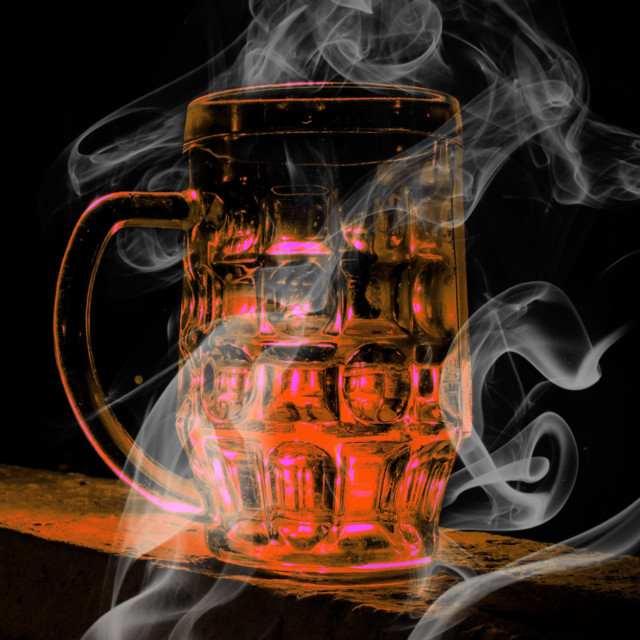When faced with another long, cold, dark winter this year, many American brewers turned to smoky flavors to amplify new seasonal releases. Pulling inspiration from places and flavors around the globe, these creations ventured far beyond the traditional beechwood-smoked malts of Bamberg, where German rauchbier gets its bacon-like character. Instead, brewers from Boston to Bend, Ore., are expanding the spectrum of smoked beer flavors by using a variety of techniques and histories.
One of the more widespread smoked winter specialty beer releases this year came from a collaboration between Harpoon Brewery and Big Spruce Brewing, a Belgian-style ale brewed with oak and cherrywood smoked malts. It first premiered in December 2020 and is still going strong throughout the tri-state area. (On Untappd, it’s checked in regularly in Massachusetts and New York.)
“It’s a smoked abbey ale that we brewed with spruce tips and aged in Glen Breton [Canadian] whisky barrels,” says Al Marzi, chief brewing officer of Mass Bay Brewing, parent company of Harpoon Brewery. Named From Nova Scotia with Love, the inspiration for the Belgian-style ale is the close relationship between the city of Boston and the people of Nova Scotia: For more than a century, Nova Scotia has sent a spruce tree to be decorated and lit in Boston Common each winter as a display of gratitude for the aid Bostonians provided them after the Halifax Harbor explosion in 1917. Just like this heartwarming tidbit from history, Marzi says, this special release “will definitely warm you up on a cold night.”
The flavor profile of Jólabókaflód from Deschutes Brewery was also guided by northern inspiration. Assistant brewer Kyle Matthias set out to “capture the essence” of an Icelandic celebration in a beer.
Jólabókaflód translates roughly to “yule book flood,” the tradition of giving books as gifts and spending Christmas Eve reading with your family. To achieve a flavor reminiscent of that holiday scene, he used a blend of Special B malt, a dark and fruity Belgian malt; Victory malt, which brings toasty and nutty flavors; and oak-smoked wheat for just a touch of smoke to mirror the experience of reading by a fire while being cozy and warm.
A version of the beer has been made for the past several winters and is growing in popularity at Deschutes’ Portland and Bend taprooms. Matthias isn’t sure about Jólabókaflód’s future as a wider release, but says it will continue to be brewed for the taproom annually.
Although released annually as a winter warmer, the beer is dosed with fresh spruce tips in place of dry hops, a step that provides aromas of citrus and melon. Because of the melding of flavors from all of these special ingredients, the beer benefits from smoked notes without tasting like a “smoked beer.”
“The smoked wheat definitely provides a layer of complexity and nuance to the overall beer,” says Matthias. He also notes that the flavor intensity of smoked wheat is much more subtle than the smokiness of beechwood or cherrywood smoked malt.
He says “Jola” as the brewers call it, is still a great beer well after the holiday season because of the nuanced smoke flavors. “When it gets too cold outside for campfires, you can bring the smoke in with you and get a similar sensation to cozying up around a fire,” he says.
It was an idea closer to home that pushed Seedstock Brewing Company head brewer Jason Abbott to brew a smoked porter this January.
“It is inspired by my grandpa’s pipe. He was in Europe during World War II. He didn’t talk about the war much, but he did talk about the smokey beers [from wartime],” Abbott says. He also brought back a number of tobacco pipes that have been passed down through generations.
Abbott says the beer lands somewhere lighter than a porter but darker than a traditional rauchbier. It isn’t Abbott’s first time working with smoked malt and he’s comfortable balancing powerful flavors from the rustic malt. Seedstock has released a Gratzer, a traditional Polish style known for low gravity and clean smoked flavors, brewed with 100 percent smoked wheat malt, and also uses smoked malts as a twist in its Wee Heavy, a malt-forward Scottish style.
Because smoke can impart everything from meaty to roasted and even spicy flavors in beer, Abbott reminds his customers, “Smoked beers vary greatly, and just because you don’t like one smoked beer doesn’t mean you won’t like another.”
Our Mutual Friend Brewing Company may have made the most unique smoked malt profile of the specialty beers by using a single type of smoked malt for the entire grist.
The phrase “traditional smoked beer” often conjures visions of German brewing heritage and the rauchbiers of Bamberg, but Jan Chodkowski, Our Mutual Friend’s head brewer, was chasing a different historical style: the Stjørdalsøl of Norway.
Classic Stjørdalsøl is made with 100 percent alder wood smoked malt. To achieve this particular grist, Chodkowski teamed up with Colorado Malting Company to grow and malt its own barley and smoke it over alder wood. The result is a dark 9 percent ABV ale with “wonderful smoke character as well as toffee and dark fruit attributes,” Chodkowski says. Handcrafted malt is the star of the show here, so there are no additional flavors from other ingredients.
“Smoked beers are perfect for winter and cold weather because they can provide perceived body and warmth without added alcohol or sweetness,” says Chodkowski.
As the weather warms and customers look for brews made to enjoy in the springtime, Our Mutual Friend releases One Sunday Morning, a light smoked wheat beer with only 3.2 percent ABV — proving that smoke can bounce between cozy and refreshing.
